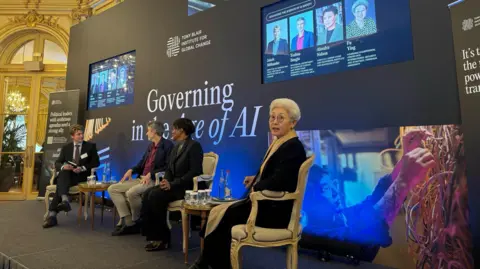 Getty Images
Getty ImagesA former Chinese official was entertained in a major international security report led by “AI Godfather” professor Yoshua Bengio and co-author from 96 global experts.
Fu Ying, former Vice President of Foreign Affairs and once the China Ambassador to the United Kingdom, is now an academic at Tsinghua University in Beijing.
The duo were talking in a panel discussion in front of a two-day global summit of him starting in Paris on Monday.
The purpose of the summit is to unite world leaders, technology leaders and academics to examine the influence of society, governance and the environment.
Fu Ying began by thanking Canada’s Prof Bengio for the document “Very, Very Long”, adding that the Chinese translation stretched on about 400 pages and she was not over.
She also had an excavation in the title of the Security Institute – of which Prof Bengio is a member.
China now has its equivalent; But they decided to call it the development and security network, she said, because there are already many institutes, but this wording emphasized the importance of cooperation.
The Summit of Action I is the welcome of guests from 80 countries, with Openai Chief Executive Sam Altman, President of Microsoft Brad Smith and Google Sundar Pichai chief executive among the big names in American technology.
Elon Musk is not on the list of friends, but it is not currently known if he will decide to join them.
One main focus is to regulate it in an increasingly broken world. The summit comes a few weeks after a change of seismic industry while China’s Deepseek discovered a powerful, low -cost model, challenging US overlying.
The couple’s bright exchanges were a symbol of the global political joke in the powerful race of his weapons, but Fu Ying also expressed regret over the negative impact of current hostilities between JSC and China on the progress of him.
“At a time when science is going to a growing trajectory, the relationship is falling in the wrong direction and is affecting the unity and cooperation to manage risks,” she said.
“Not too sorry to come.”
She gave a carefully worked look behind the curtain of China’s scene, describing an “explosive period” of innovation since the country first published its development plan in 2017, five years before the chatgt It became a viral sensation in the west.
She added that “when the rhythm [of development] It’s fast, dangerous things happen “but it doesn’t elaborate on what may have happened.
“Chinese move faster [than the west] But it’s full of problems, ”she said.
Fu Ying argued that building the tools of he on the foundations that are open sources, meaning everyone can see how they work and therefore contribute to their improvement, was the most effective way to make sure that The technology did not cause harm.
Most American technology giants do not share the technology that runs their products.
 Maria Axente
Maria AxenteThe open source offers people “better opportunities to detect and solve problems,” she said, adding that “the lack of transparency among the giants makes people nervous.”
But Prof Bengio disagreed.
His appearance was that the open source also left technology open to criminals to misuse.
He admitted that “from a security point of view”, it was easier to discern issues with the Assistant of Chinese viral Deepseek, which was built using open source architecture than chatgpt, whose code is not divided by his Creator Openai.
On Tuesday it is the turn of world leaders including French President Emmanuel Macron, India Prime Minister Narendra Modi and US Vice President JD Vance to hold Summit talks.
Discussions will include how it will affect the work world and use in the public interest, and how to alleviate its risks.
A new $ 400 million partnership among some countries has also been announced, aiming to support initiatives that serve public interest, such as health care.
In an interview with the BBC, UK Secretary Peter Kyle said he thought it would be dangerous for the United Kingdom to fall behind in his technology approval.
Dr. Laura Gilbert, who advises the government in him, said she believed it was essential to maintain NHS because of the efficiency she promised. “How will you finance the NHS without catching him?” she asked.
Matt Clifford, who wrote the action plan in the UK which the government fully accepted, warned that technology would be “more radical” than when printing was replaced with word processing as computers began to enter the place of work.
“The industrial revolution was the automation of physical work; it is the automation of cognitive work,” said Marc Warner, Head of the Faculty of Firm. He added that he did not believe his two -year -old child would “have a job as we know them today.”
